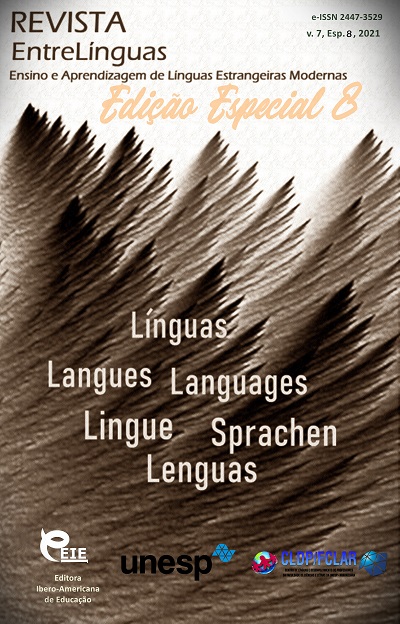Epistemology of communicationsocial processes: synergetic approach
DOI:
https://doi.org/10.29051/el.v7iesp.8.16345Keywords:
Communication processes, Multi-complex systems, Communication, Complexity theory, Non-linearity, Emergence, SynergeticsAbstract
The article considers the results of research on social systems based on the principles of the complexity Paradigm. Our research task is centered around the analysis of communication processes in social systems. The purpose of this work implies the reflection on the epistemology of communication processes, aimed at studying the parameters one can find in social systems of the ‘human’ type. We apply the complexity Paradigm as a theoretical and methodological basis and as well rely on the Complex analysis of discourse that has been obtained as a result of our previous research on discourse theory and its modern achievements. This study made use of the general scientific methods such as analysis and synthesis, modeling and idealization, as well as concretization and abstraction. The interdisciplinary nature of this study determines the scope (set) of the methods being used, although it primarily focuses on a synergistic approach.The results of this work represent a new approach to the study of the dynamics of the development of communication processes in social human systems. The conclusions presented in the article fix the paradigm transformations caused by the penetration of the Multi-complexity category into the research space of social sciences, which acts as a new version of the complexity Paradigm.
Downloads
References
AL'BEKOV, N. N. (2015). Emerdzhentnost' kak ob"yekt sovremennoy nauki. Sovremennyye problemy nauki i obrazovaniya [Emergence as an object of modern science. Modern problems of science and education], 2, 421-421.
ARSHINOV, V.I., BUDANOV,V.G. (2016). Paradigma slozhnostnosti i sotsiogumanitarnyye proyektsii konvergentnykh tekhnologiy [The complexity paradigm and the socio-humanitarian projections of convergent technologies]. Voprosy filosofii, 59-70.
BAKHTIN, M.M. (1979). Estetika slovesnogo tvorchestva [Aesthetics of verbal creativity]. Ripol Klassik.
BARABASI, A.-L. (2014). Linked. How Everything Is Connected to everything else and What It Means for Business, Science, and Everyday Life. New York: Basic Books.
DAWES, S. (2020). Brian Castellani on the Complexity Sciences, 2014. [Электронный ресурс] URL: https://www. theoryculturesociety. org/brian-castellani-on-the-complexity-sciences/. (Accessed: 20.06.2020)
LATUR, B. (2002). Dayte mne laboratoriyu i ya perevernu mir [Give me a laboratory and I will turn the world upside down]. Logos, 5, 1-32.
LOZARES, C. (2010). De la complejidad social a su compleja metodología [From social complexity to its complex methodology]. URL: http://www.fes-sociologia.com/files/congress/10/grupos-trabajo/ponencias/2.pdf (Accessed: 20.06.2020)
MATURANA, H.R. (2020). Biology of love. Focus Heilpadagogik. G.: Peterander, F. (Hrsg.): Ernst Reinhardt, Munchen/Basel. URL: http://www.terapiacognitiva.eu/cpc/dwl/PerMul/biology-of-love.pdf. (Accessed: 20.06.2020).
MOROZOVA, N.I., BURYAKOVA, O.S., & ALIYEVA, N.Z. (2019). Metodologicheskiye vozmozhnosti nelineynogo podkhoda v poznanii global'nogo tsifrovogo prostranstva [Methodological possibilities of a non-linear approach in knowing the global digital space]. Nauka i obrazovaniye: novoye vremya, 316-322.
PILOTO RODRÍGUEZ, J. A., & NIKOLAEVA, E. M. (2019). Social Human System as an Epistemological Problem of Complexity Theory. International Journal on Emerging Technologies, 10(2a), 170-172. URL: https://www.researchtrend.net/ijet/pdf/Social%20Human%20System%20as%20an%20Epistemological11.pdf (Accessed: 20.06.2020)
PISAREVA, S.A., & TRYAPITSYNA, A.P. (2019). Nelineynost' obrazovatel'nogo protsessa v vysshey shkole [Nonlinearity of the educational process in higher education]. In Nauchnyye shkoly instituta pedagogiki, 61-65.
SOSA, L. (2012). Diseño basado en sistemas adaptativos complejos. Tesis para obtener el grado de doctor en Filosofía [Design based on complex adaptive systems. Thesis to obtain a Doctor of Philosophy degree]. Universidad Autónoma de Nuevo León, 35
YEVSYUKOVA, T.V., ABRAMENKO, Y.V. (2019). Spetsifika nelineynoy organizatsii kategorii vremeni v nauchno-fantasticheskom povestvovanii (na materiale romana K. Vonneguta ‘Boynya nomer pyat») [ The specifics of the nonlinear organization of the category of time in a science fiction narrative (based on the material of K. Vonnegut’s novel ‘Slaughterhouse Five’]. Nauchnaya mysl' Kavkaza, 3(99).
МАLDONADO, C. E. (2016). Complejidad de lascienciassociales. Y de lasotrasciencias y disciplinas [Agent-based models: epistemological and theoretical contributions to social Research]. URL: https://www.researchgate.net/publication/304581600 (Accessed: 20.06.2020)
Downloads
Published
How to Cite
Issue
Section
License

This work is licensed under a Creative Commons Attribution-NonCommercial-ShareAlike 4.0 International License.
Os manuscritos aceitos e publicados são de propriedade da Revista EntreLínguas. Os artigos publicados e as referências citadas na Revista EntreLínguas são de inteira responsabilidade de seus autores.
Transferência de direitos autorais – autorização para publicação
Caso o artigo submetido seja aprovado para publicação, já fica acordado que o(s) autor(es) autoriza(m) a UNESP a reproduzi-lo e publicá-lo na EntreLínguas, entendendo-se os termos “reprodução” e “publicação” conforme definição respectivamente dos incisos VI e I do artigo 5° da Lei 9610/98. O artigo poderá ser acessado pela rede mundial de computadores (Internet), sendo permitidas, a título gratuito, a consulta e a reprodução de exemplar do artigo para uso próprio de quem a consulta, desde que haja a citação ao texto consultado. Essa autorização de publicação 328 EntreLínguas, Araraquara, v. 1, n .2, p. 323-328, jul./dez. 2015 não tem limitação de tempo, ficando a UNESP responsável pela manutenção da identificação do(s) autor(es) do artigo. Os artigos publicados e as referências citadas na Revista EntreLínguas são de inteira responsabilidade de seus autores.











